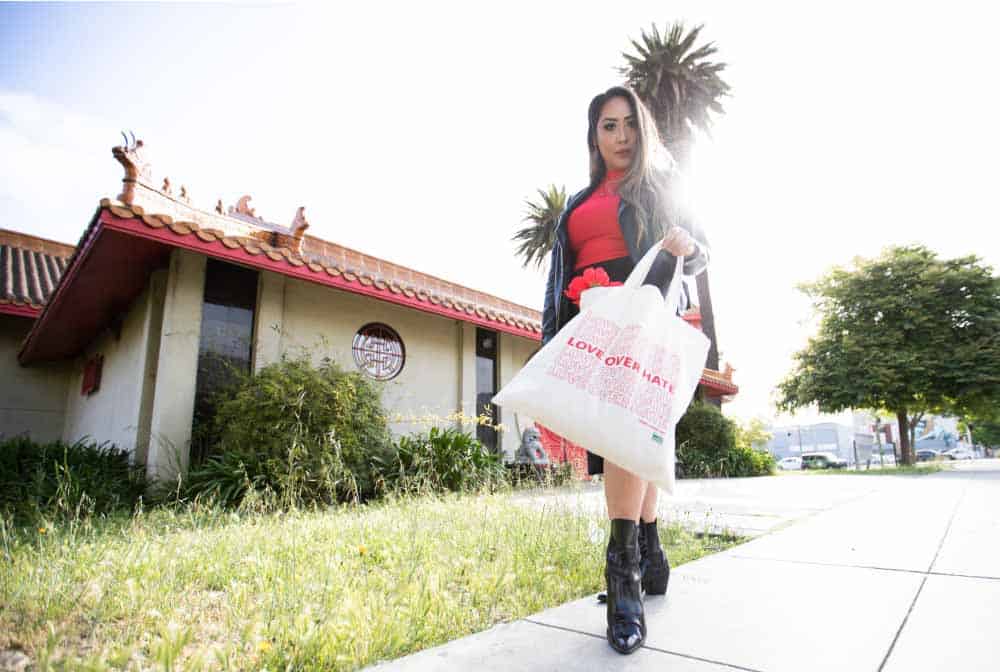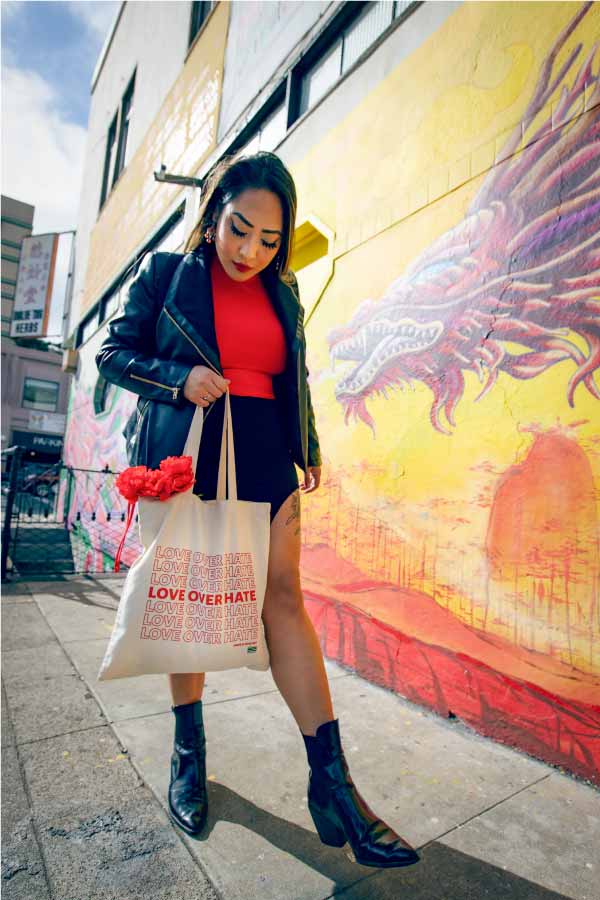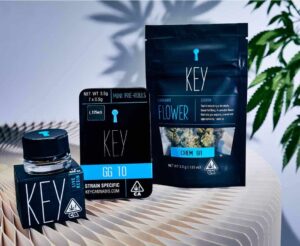A Discussion with Alexis Mora
Leader of Key Cannabis
Honoring AAPI Heritage Month, Harborside’s Cannabis Is: Love campaign celebrates AAPI voices and leaders in the industry.
Harborside is currently in the midst of its Cannabis Is: Love campaign to amplify community focused voices and leaders within the industry by continuing to reflect one of its core values “Love over Hate”— and not only is May AAPI Heritage Month, it also happens to be an incredibly turbulent time for the community as hate crimes against Asian Americans have become an epidemic across the United States.
In this feature we speak with Alexis Mora who leads the Key Cannabis brand based out of Salinas, CA. Alexis may be known as an innovative marketing thought leader, but her active dedication to community advocacy and social justice resonates with the pre-green rush wellness focus that cannabis activists championed early on—bringing much needed levels of awareness and compassion to an ever changing competitive industry.
What inspired you to work in the cannabis space?
Back in 2015, I was working for a full-service marketing agency that specialized in active lifestyle, cause marketing, and various functional beverages. An ex-coca cola executive who was a client of ours asked us to do some due diligence in the cannabis space to see what the opportunities were. It was at this time where I really saw this as a feasible industry that would take off and get legs at some point, so from there I took the leap of faith into becoming seriously involved in the industry.
From an industry perspective there really weren’t a lot of established brands. As a marketer, I saw amazing potential for brand building, marketing, and for retail space — since the industry is not a mature industry, we are still learning things on a daily basis. Just the business opportunity alone was very attractive but secondarily there was this other kind of call to action because I didn’t want to be labeled as a lazy stoner or because I didn’t believe in the negative stigma that my community held about the plant that I had personally seen positively benefits people’s lives. I wanted to break the stigmas and barriers by simply being in this space.
That was when I found my role at Bloom Farms as employee number 7. I was part of scaling and growing the company to eventually become a top ten California cannabis brand with over 200 employees.
What I saw back in 2015 was something very different from what we see today. And one of the things that really stuck with me was the lack of representation from multiple different facets. I didn’t see a ton of women in the industry, I didn’t see a ton of people of color in the industry, and I also didn’t see the industry represented in a very positive light.
I wanted to fight back against that narrow stereotype, by showing people that there’s other ways to enjoy, and consume, and be, and your consumption of cannabis isn’t a descriptor of who you are as a person.
Now being 6 years into it and having seen a lot, the thought for progress and destigmatization as well as the fight for fairness in terms of how the cannabis industry operated and treats marginalized communities in this space is still not over. But it’s good to see that I’m not one of the only ones in this kind of fight.
What hurdles do you face as a woman of color in the cannabis industry?
I would say the first hurdle I had to face was one that was internal. Because I was raised to be “a good Asian woman” I think a lot of times the expectation subconsciously at least was to not make waves, to be polite, to be very appeasing, and that’s just kind of what the narrative is. So for me it was kind of getting over a lot of the barriers of being Asian but also as a woman and being outspoken and being a force. And cannabis is a good platform to do just that.
When I started back in 2015, it wasn’t like I saw a ton of other people who looked like me. And oftentimes when we’re breaking down the demographics for cannabis, you’ve got a set percentage of white, then you’ve got a set percentage of black, but then the asian community is just considered an “other”, like we don’t even have our own representation as it relates to demographic information.
At the time, around 2018, my family was in Las Vegas and it was back when Nevada voted on making cannabis adult use legal. It really started with my mom and I sitting down and saying “Ok, let’s talk about weed and its legalization.” The initial conversations with my mom were like “would you deny a cancer patient cannabis treatment because of the moral argument you have around it?” and going from there.
It’s also from a personal level, my wanting to debunk cannabis stigma. In discussions with my family I would compare cannabis to alcohol, I would have to ask them “is everyone who partakes in alcohol an alcoholic?”
For a very long time I couldn’t be honest with my family up until recently. And for whatever that’s worth its been a very liberating process, because it’s taken lets say someone like my mom who would literally be offended by the smell and would whisper the word “weed” in public — to having her listen with an open heart and open mind about these particular instances that didn’t allow her to broadstroke cannabis negatively into a corner. Personally and professionally I’ve come a very long way, and an industry that maybe I wouldn’t have even considered a viable industry back then is now an industry that I can probably call my home.
My experiences lend themselves to offering a more broader perspective to how our brands are built or the types of community initiatives we support or even more in some of our business practices. I think it’s making sure that we have, and are actively pushing for, support for other women in the space, other people of color in the space, other marginalized communities in the space, and we have to be able to speak up and out against some of the things systemically that don’t support us.
Overall there should be brands made for women and there should be brands made for people of color — you’re essentially trying to benefit your own communities in that kind of way so that you can feel heard and seen. We have to be protective and proactive of our communities as the industry is developing.
What wins in the industry are you most proud of?
The companies that I’ve worked for and now work with allow me to have a voice and a platform to be able to do things that will incrementally change either the industry or the communities in which we serve. I’ve always been the type of person that I need to believe in a product or believe in a brand for me to do my best work. So I’ve always been drawn to mission-driven/oriented companies. At Bloom Farms we pledged that we wanted to help fight the battle of food insecurity within California. So during my time there we donated over 2 million meals to food-insecure families in California and Nevada through our network of food bank partners. Feeding 2 million meals to families while doing what you love, that’s an incredible feeling.
When you have leaders like women or people of color in leadership roles, you also support and call out initiatives that do those things and accomplish those things. We were able to host a women’s thought leadership assembly event where we brought industry leaders together as a cohort of women to really talk about what it all means and how we can best support each other through sharing knowledge, sharing best practices, sharing stories, and finding a way to work the system in a way so that it make it beneficial for us, so that was a really great event. We also partnered with brand partners to grant 5 women a scholarship to an expenses paid female entrepreneurship summit.
Harborside has such a great legacy in terms of really being an advocate for the cannabis community. So their mission really drew me to the company initially. And we were able to launch our Cannabis Is: campaign which essentially focuses on Harborside’s core values. When we kicked off the campaign we wanted to make sure that it was all encompassing and really helping support some of the brands and initiatives surrounding our core values starting with diversity. So it was essentially a call to action from the Harborside perspective of making sure we were creating room and shelf space for BIPOC-owned or marginally owned brands. So it was creating shelf space for that, it was bringing brand awareness towards some of these BIPOC brands, owners, founders, it was having these real conversations around what the hurdles are in the industry and most importantly what we can do about it.
With having kinds of campaigns like that with Cannabis Is: Diversity or this initiative of Love over Hate and having the donation component affiliated with it. These are the kind of times where you look at actionable change. Had I or had some of these other BIPOC lead/founded brands not been at the forefront of this initiative, would they have still happened? My hope is yes, but until that time, until it’s no longer a fight that we need to have, I do feel like most of us are still going to keep the good fight going until we are equally represented or seen or heard or embraced. I would say that those are some of the biggest wins I have had in the industry so far.
Are there other cannabis leaders in the AAPI community that you look to?
I want to give some shout outs to some other bad ass Asian women in particular that I have had the pleasure of getting working with. One of them is one of the cofounders of Sundae School Jen Tran — talk about a social justice badass who really puts her money where her mouth is in terms of leading the charge and the conversation about AAPI advocacy issues within the space! The expression of bringing Asian fashion and Asian flavors to the forefront is amazing to see so it’s been a pleasure watching Jen and Mia really formulate these fantastic products that are beautifully packaged as well as their apparel line as well. They should feel really good about that.
Another person I would love to shout out is Felicity Chen from Potli. I appreciate the fact that Felicity participated in our Cannabis Is: Diversity campaign. In a conversation with Felicity, she brought up a great point — If you don’t have asian creators at the forefront, you’d never have a product like infused sriracha or shrimp chips to the market. Her product formulation that initially started with honey sourced from her family’s farm in Hayward was really to intersect her culture in terms of creating a product that her mom would basically use with her tea every day.
It is so great to see these brands and formulations that are not only inspired by our culture but also celebrated in their products, they’re not leaning into the mass market familiarity, they’re introducing new products from a unique perspective. Which is beautiful to see.
I also want to give a shout out to Ophelia Chong who has been in this space for a very long time representing the Asian community, being a fierce and vocal advocate as well, and for creating platforms for other Asian leaders and founders in this space — thank you for creating a safe platform for us, and for doing the work back when it wasn’t the cool or convenient thing to do!
Alexis, thank you so much for speaking with us today!

Cannabis Is: Love — AAPI Heritage Month
Interested in contributing to AAPI community wellness? Harborside is currently fundraising for 18 Million Rising, an organization focused on AAPI community development and political representation, by launching a limited run of “Love over Hate” AAPI-designed tote bags with proceeds heading to 18MR. 18MR strives to build a collaborative platform to foster conversation, network for growth, advocate politically for AAPI folks, and work strategically to prevent violent harassment.
Purchase a limited edition “Love over Hate” tote bag here.
Want to learn more about 18 Million Rising? Visit: https://18millionrising.org/
 Key Cannabis — Unlock Your Mind
Key Cannabis — Unlock Your Mind
Key Cannabis is a world-class terpene rich brand from the sunny farmlands of the lush Salinas Valley. Greenhouse grown in one of the most agriculturally ideal areas of the country, Key integrates technology, nature, and traditional agriculture to produce single-origin strain-specific cannabis year round while maintaining one of the smallest carbon footprints in the industry. From flower to pre-rolls, concentrates to limited-edition pre-roll packs, Key has something for everyone.
Unlock your curiosity at: https://www.keycannabis.com
Key is also available at your local Harborside store: https://shopharborside.com/oakland/



 Key Cannabis — Unlock Your Mind
Key Cannabis — Unlock Your Mind